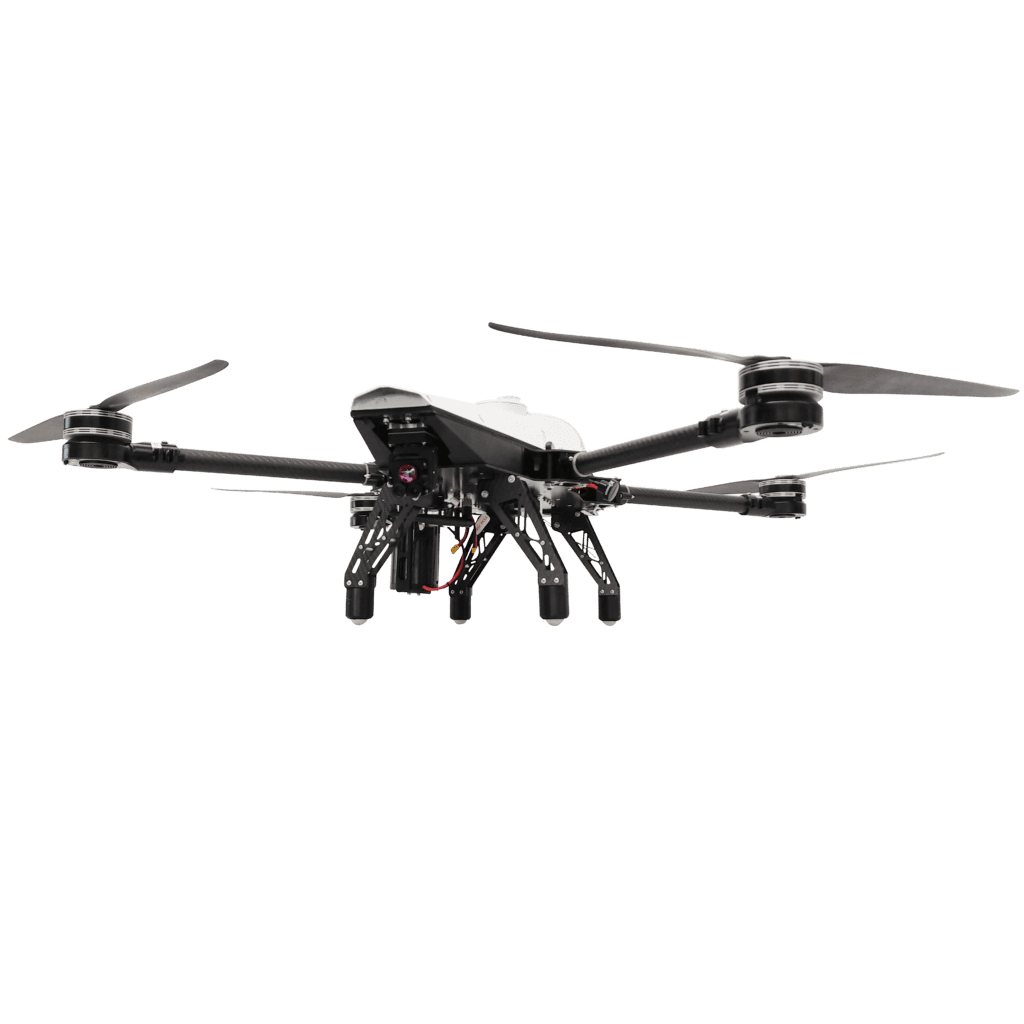
Asylon announced that the FAA has granted waivers for beyond visual line of sight (BVLOS) operations of their automated security drone system at four sites in the U.S. (Photo courtesy of Asylon)
Last week, Asylon Inc. announced that they have received waivers from the Federal Aviation Administration for beyond visual line of sight (BVLOS) operations of their automated security drone system at four sites located in the U.S.
Asylon’s security use-case is “perfect,” remarked Asylon advisory board member Dan Elwell, who is also a former Acting Administrator of the FAA. “The remote operations are built out, the process developed with securing this last waiver is scalable, and the sheer number of automated flights Asylon has done to prove the safety case is incredible,” he stated.
DroneSentry, Asylon’s security drone system, is capable of automated aerial security patrols and pre-programmed response missions, and can perform live 24/7 remote video monitoring. It is also built with a modular design for various payload types.
“We’ve been thinking about the waiver track since the beginning, and it’s inherent in our design,” said Damon Henry, Asylon’s co-founder and CEO. Asylon’s system was the first U.S.-based drone to receive ASTM certification for the parachute, something that was built into the system from the beginning.
As the company began to scale operations in 2021, they began considering how to scale remotely piloted operations on a national level in a cost-effective way. Their Robotic Security Operations Center (RSOC), located in Norristown, Pennsylvania, is an important part of Asylon’s strategy, Henry explained. “Our vision is to fly all of our aircraft from a centralized location,” he said. “Having security analysts logging in, monitoring those missions, managing everything nationwide—we see that as the key to enabling wide-scale operations of any sort of robotics.”
The BVLOS waiver awarded to Asylon for its customer GXO Logistics designates a remote pilot in command (RPIC) that will work out of the RSOC to control the DroneSentry system at the customer’s site in Indiana.

Asylon’s robotic perimeter security solution includes DroneDog—a ground-based system pictured above in yellow and black colors—and DroneSentry, the autonomous drone pictured above in flight. (Photo, courtesy of Asylon)
A challenge with launching drone operations is proving the safety of new technological solutions to regulators. Asylon is close to reaching 25,000 remotely flown missions, a significant milestone that will help the team demonstrate operational safety to the FAA.
“We are actively working on detect-and-avoid; that is a big component to beyond visual line of sight for anybody in this space,” Henry shared. “There’s a lot to come there in the next few business quarters for us, [and] continued expansion with GXO and a few other customers that are starting to scale up. We’ll start announcing even wider-scale operations here soon.”
Brent McLaughlin, co-founder and COO of Asylon, remarked that they have created a scalable and templated process with an emphasis on safety. “These initial BVLOS waivers are a significant step for scaling our operations to meet the massive demand of the security industry,” he added. “We’re certain automated end-to-end rapid response aerial vehicles like DroneSentry will create safer facilities for our customers and their employees.”
The drone delivery company Zipline also announced this week that the FAA granted it a Part 135 Air Carrier Certificate. Now, Zipline is allowed to fly routes up to 26 miles and perform BVLOS operations. The company’s first flights following the certification will take place in North Carolina where drones will carry out medical delivery services.
DroneUp, a company operating drone deliveries in Arkansas in partnership with Walmart, expects to extend their range of operations to BVLOS flight soon, following the FAA’s go-ahead. “At some point, regulators have to acknowledge that we’re operating safely—not just us, but as an industry. We’re very confident that the regulatory environment is going to enable longer-range operations,” commented DroneUp’s founder and CEO, Tom Walker.
In February, Iris Automation—an avionics technology company—received FAA approval to fly autonomous drones beyond visual line of sight in an area of Nevada. Iris Automation will use the Casia X, its onboard DAA technology, to evaluate the system’s ability to improve safety in performing rescue operations.
Amazon has also announced plans to start BVLOS operations with its Prime Air drone delivery service by the end of 2022. The company has developed a “sense-and-avoid” system for enabling safe BVLOS operations with its Prime Air drones.